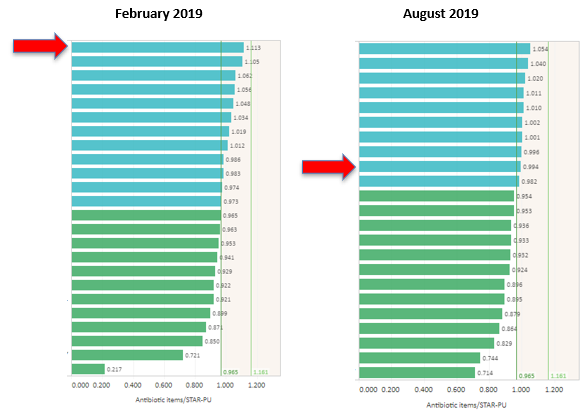 by Katie Perkins, Medicines Management Adviser Hastings & Rother Clinical Commissioning Group
by Katie Perkins, Medicines Management Adviser Hastings & Rother Clinical Commissioning Group
At the end of 2018 I took on the role of CCG medicines management lead for antimicrobial prescribing (alongside promotion to Medicines Management Adviser and respiratory lead). I work across two CCGs which cover 43 GP practices.
RPS AMS training
The RPS AMS training programme became available at just the right time in terms of my new role and immediately before the start of our 2019/20 prescribing support scheme. I was already out and about talking to GPs about their antibiotic prescribing and in particular three out of the 10 practices that I look after were particular outliers for antimicrobial prescribing. The learning that I undertook as part of the course, particularly in Quality Improvement (QI) methodology was invaluable and we were given a brilliant opportunity to “try this out in practice” with tutor support.
My QI project
The QI project I chose was to reduce inappropriate prescribing of antibiotic rescue packs for COPD exacerbations and ultimately for this to help reduce the total number of antibiotic items (per STAR PU) prescribed by the practice.
I carried out a patient level search at the practice to identify people with COPD who were prescribed an antibiotic rescue pack on repeat prescription. 22 people were identified and 9 of these had received six or more courses in the preceding twelve months.
In preparation for presenting this to the practice I met with a nurse at another practice which had robust and effective processes in place for the issue and follow up of COPD rescue packs – this was helpful in ensuring that I had a realistic handle on what is reasonable to expect in practice.
I met with the four practice GPs, pharmacist and practice manager and presented them with the list of these patients. I asked them to review each one to determine if the antibiotic remains appropriate. I provided them with current national guidance from NICE on this area as well as our local formulary guidance.
Where an antibiotic rescue pack was appropriate, the GPs were asked to consider only prescribing this as an acute prescription (not on repeat) or, as a compromise, if they would prefer to keep them on repeat, to consider a maximum of two issues before the patient was reviewed. I was surprised that the practice agreed to move all prescriptions to acute and for all new rescue pack prescribing to be issued only on acute.
They also agreed to include instructions in the rescue pack directions for the person to contact the surgery when they started taking it. The practice already had a leaflet that they give out to people when they are first prescribed a rescue pack - they now aim to give this out more consistently.
Results and impact of my QI project
Before the QI project (February 2019) the practice was the highest prescriber of antibiotics in the CCG (total items/STARPU). The latest data from PrescQIPP (August 2019) shows that the practice has dropped to the 9th highest (out of 23 practices) and reduced their total antibiotic prescribing by 10%.
Practice bar charts Antibacterial items/STAR-PU showing 12 months rolling data to August 2019

This is likely to be in part due to the reduction in rescue pack prescribing but I suspect that the project may also have provided a renewed focus on reducing inappropriate antibiotic prescribing more generally.
Getting all the GPs and the practice pharmacist together and presenting the data to them face to face really got them thinking about the possible consequences of these repeat prescriptions. They all committed to reviewing these patients and they have changed their behaviour when it comes to managing COPD rescue pack prescribing.
Next Steps
As mentioned previously the response to my QI project proposal by the practice pleasantly surprised me and this has given me the confidence to roll the QI out to the other 42 practices across the CCGs. I also plan to look at other areas of repeat prescribing of antibiotics such as UTI prophylaxis and long term prescribing for acne and rosacea.
Find out more about our AMS training in England